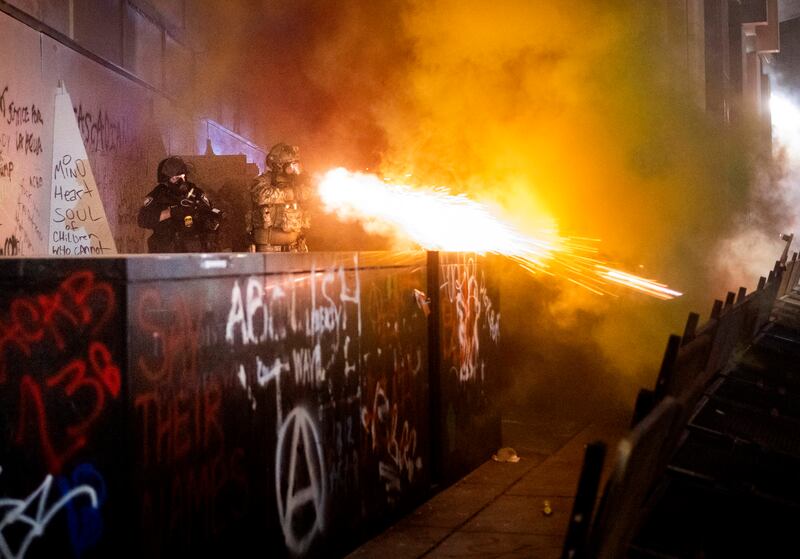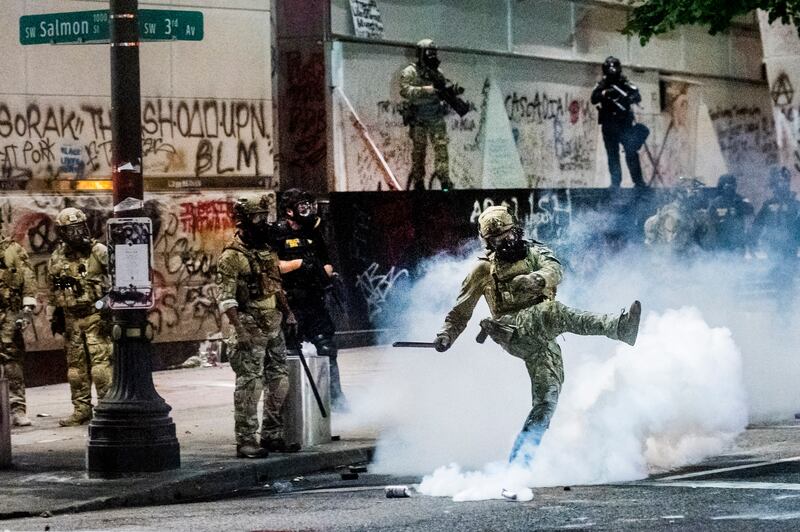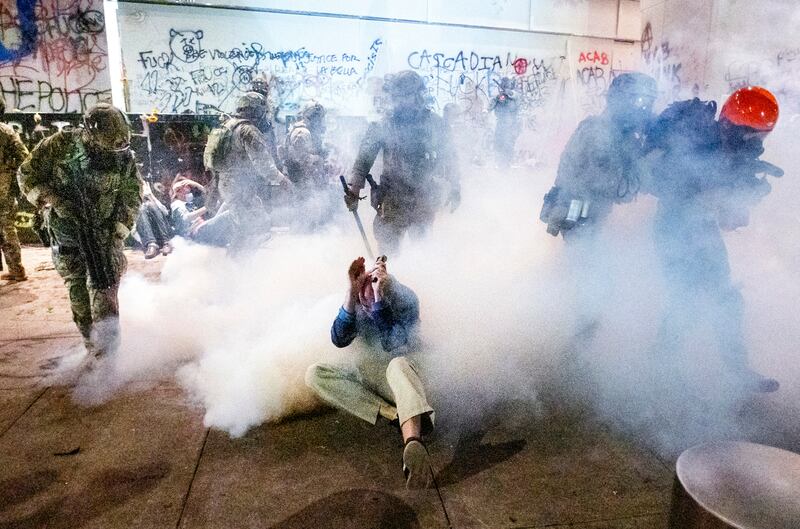SALT LAKE CITY — In recent weeks, the area surrounding the Hatfield Federal Courthouse in Portland, Oregon, has looked like a war zone. Federal agents dressed in full camouflage and tactical gear have used tear gas, flash bangs and physical force to clear crowds of protesters. Several videos show the officers emerging from unmarked vans to apprehend people on the street, but it’s unclear from the footage if those people have committed any crimes.
From one perspective, what’s happening in Portland looks like an overreach of federal power as President Donald Trump uses undue force to interfere in a case of local conflict —against the wishes of state and city leaders. From another, it looks like the president is simply stepping up to protect federal property after local officials have failed to do so.
While the president has said he plans to send federal agents to other Democrat-run cities in an attempt to restore law and order, citizens and elected officials across the country are asking if police force is the best way to quell the unrest.
“I want to look at and understand exactly who was sent by whom, for what purpose?” Sen. Mitt Romney, R-Utah, said of the use of federal agents in Portland in an interview with the Deseret News Wednesday. “What were they doing there? Who were the people that they interdicted? Why do they interdict them? That’s something that we have not received a briefing on yet.”
While local media like the Oregonian have reported that the Portland protests have been largely peaceful, including demonstrations by women locking arms and calling themselves “the wall of moms,” the Department of Homeland Security says it is responding to “violent anarchists.” According to DHS, the Hatfield Federal Courthouse has been under “siege” for more than 50 days. “Rioters” have allegedly attacked officers with hard projectiles, fireworks and lasers. They have vandalized the building with graffiti and fires and illegally breached the entrance, DHS reported.
Utah’s congressional representatives have had mixed responses to news from Portland, reflecting a need for more information about law enforcement actions there and concrete details about the arrests that have been made.
Rep. Ben McAdams, D-Utah, said that he supports peaceful protests as well as police officers who put their lives on the line “to protect our safety.” He condemns uses of violence and vandalism. However, he is concerned about some of the allegations against federal officers he has heard.
“I worry that their presence might serve to escalate tensions at a time when we need to work together to de-escalate and restore calm. I agree with my Utah colleague Sen. Lee when he says that if people are being detained without probable cause, that may violate the Constitution,” McAdams said in a statement. “As we’ve seen in Utah, local officials and governors are the best judges of the response to demonstrations in their communities when lives and property are threatened.”
Rep. Christ Stewart, R-Utah, has made it clear he supports the president’s authority to send officers to protect federal property.
“It is illegal to assault law enforcement and destroy property. Federal officers have a responsibility to protect federal property. Outside of that, it should be left to local police to enforce the law,” Stewart said in a statement.
Conn Carroll, communication director for Sen. Mike Lee, R-Utah, agrees. “Violent mobs have been vandalizing and burning the federal courthouse in Portland for weeks now. The Federal Protective Service has every legal authority to protect that property.”

Is Trump sending federal troops to other cities?
Trump announced Wednesday that he plans to extend the deployment of federal agents to Chicago and Albuquerque, New Mexico. He’s also expressed to reporters a desire to send reinforcements to other cities including Philadelphia, Detroit, Baltimore and Oakland, California.
The president’s efforts in Chicago and Albuquerque will be different from what’s happening in Portland, however, where law enforcement personnel’s primary purpose is protecting federal property.
“There are no federal courthouses under siege in those other cities, and in many, there haven’t been disruptive demonstrations and riots for weeks now,” said Walter Olson, senior fellow at the CATO Institute, a libertarian think tank based in Washington, D.C.
Instead, the president will replicate a program called “Operation Legend,” already implemented in Kansas City, Missouri. In a broader effort to combat crime, he plans to increase the number of agents from the FBI, the U.S. Marshals Service, the Drug Enforcement Administration and the Bureau of Alcohol, Tobacco, Firearms and Explosives.
On Tuesday, 15 local officials — including Washington, D.C., Mayor Muriel E. Bowser; Kansas City, Missouri, Mayor Quinton Lucas; and Portland Mayor Ted Wheeler — sent a letter to Attorney General William Barr and Acting Secretary for DHS Chad Wolf saying they objected to the deployment of federal forces to U.S. cities, which they said was “unprecedented and violates fundamental constitutional protections and tenets of federalism.”
Chris Talgo is editor and research fellow at the conservative Heartland Institute based north of Chicago. He welcomes more federal law enforcement officers to the city, which has one of the worst murder rates in the country.
“My gut instinct is for Chicago to cooperate with these federal agents,” said Talgo. “They are going to try to help squelch the violence that is just literally out of control right now.”
“The federal government has the full authority to send in agents from their various police organizations,” Talgo added. “These are not Navy SEALs going in rappelling from Blackhawk helicopters and picking people from their homes, and it’s laughable that I think some people are trying to portray it as such.”
Is there historical precedence for this?
While there are numerous examples of presidents sending federal personnel to help enforce laws across the country, it has been many decades since a president has done so despite opposition from local leaders, said Lindsay Cohn, an associate professor at the U.S. Naval War College with expertise in civil-military relations.
Before this year, the last time there was a major federal deployment in response to a large-scale urban protest was 1992 during the Rodney King riots in Los Angeles, Cohn said. Then, President George H.W. Bush invoked the insurrection act, which allowed him to send federal law enforcement and military troops. At the time, local leaders welcomed the help. On Monday, the House voted to add limits to this act after Trump threatened to invoke it.
“There are very few instances of a governor explicitly saying ‘don’t come,’ and the president sending federal forces anyway,” said Cohn. “Most of the time, if local authorities object, the feds have respected that.”
The primary exceptions include the 1894 Pullman strikes in Chicago, the Little Rock crisis in 1957 and the Ole Miss riots in 1962, said Cohn.
According to Olson, what is new is the proliferation of new powers and duties assigned to law enforcement agencies like Customs and Border Protection and the Department of Homeland Security. The president sent a few dozen officers from these agencies to Portland.
“The federal government has slowly accumulated police powers, which are supposed to be exceptions for one area or another special area. Then we wake up and they’ve arranged the flexibility to use them in new ways and new places,” said Olson. “There’s good reason to be critical about it.”
In an interview on Fox News on Monday, DHS Secretary Chad Wolf said, “I don’t need invitations by the state, state mayors, or state governors to do our job. ... We’re going to do that, whether they like us there or not.”

Is it legal?
Experts agree that federal officers have broad authority to enforce federal law and defend federal property across the country, whether or not state and local leaders express support.
“Strictly on legal grounds, there’s almost zero argument for mayors and governors to tell the president, ‘You’re not allowed to be here,’” said Talgo.
What’s ambiguous is whether or not the personnel in Portland are going beyond defending the Hatfield Federal Courthouse by generally policing demonstrations and enforcing state laws, according to Cohn. While it’s legal in Oregon for them to do so, state law requires both that federal officers identify themselves and receive certification from the state that they are properly trained. It’s unclear if these stipulations have been met, Cohn said.
Additionally, there have been allegations that the federal officers in Portland have arrested people without probable cause. In any case, this would be illegal, said constitutional scholar Robert Schapiro, a professor at Emory University School of Law.
“I think this kind of large-scale federal intervention without the request of state and local authorities is extremely unusual, so the fact there are allegations that federal authorities are violating the constitution is serious,” Schapiro said.
The officers are hard to identify. Is that allowed?
One of the more alarming facts about the federal agents in Portland is that they have been traveling around the city in unmarked vans. Additionally, while at least some of the officers have alpha-numeric codes on their uniforms and small badges indicating their agencies, it is not immediately clear based on their attire who these law enforcement officers are, according to CATO. However, experts say there is nothing illegal about this.
James Blumstein, professor of constitutional law and health law and policy at Vanderbilt University, said that it’s good for officers to have their names on their uniforms for accountability, but on the other hand, there have been serious cases of abuse where officers and their families have been doxxed, bullied and threatened for doing their jobs.
“If all of the sudden your name gets on the internet, you could start having a crowd-sourced mob come to your house. I don’t think any reasonable person would want his or her name out there,” Blumstein said.
Olson has a different point of view. He said that officers who cannot be identified are more likely to act aggressively and break the law with impunity.
“Even if it is currently legal, we should ask the question of should it be legal?” said Olson.
“If you want to prevent misunderstandings that cause people to choose self defense instead of compliance, they need to know right away who is a genuine authority and who is just someone who wants to get in a fight with them,” said Olson.


